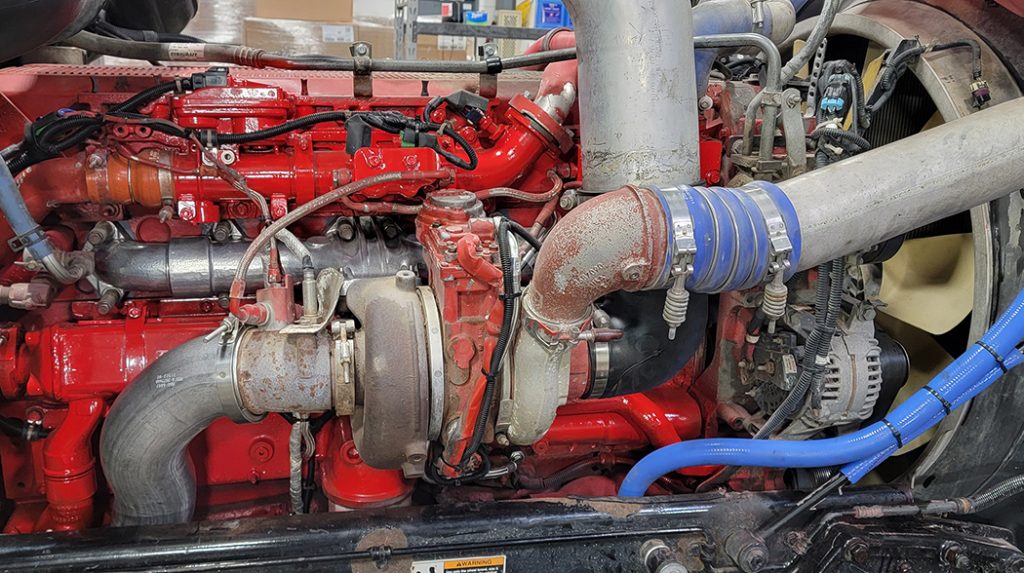
When the emission system is working correctly, removing it is unnecessary. If the shop you are using cannot repair the emissions, find an intelligent shop that understands the system. DPF alternatives have the best process for cleaning the DPF filter. However, many of the franchisees are not equipped to remove or troubleshoot the emissions system. You would have to call the dealer nearest to you and ask them. We at Pittsburgh Power know the systems – we are a DPF Alternatives franchise and can clean DPF filters and diagnose the entire system, including the ECM, repair problems like making too much soot, too many regens, and/or check engine lights.
Most of our clients use our Max Mileage Fuel Borne Catalyst, invented by Dr. Jane Gates, and it can and will keep your engine and emission systems clean. However, problems such as faulty sensors, an SCR at the end of its useful life, or a broken wire harness can happen. Any emissions problem can be fixed at our facility, and your truck can be kept legal and powerful with an extended engine life and excellent fuel mileage. I know several great service managers that will be able to help you with emission problems. Do yourself a favor, continue running the Max Mileage Catalyst, eliminate 90 percent of the problems, and enjoy the benefits of a clean engine.
Just today, I received a call from an older owner operator (from California no less!) who should have known better than to have his truck deleted. It’s a 389 Peterbilt powered by a 485 ISX with 800,000 miles. The engine runs well, but there were some mechanical issues with the emissions system, and the mechanics needed to be educated on the internal workings of the emission system. But instead, they just deleted his system, and then improperly set the ECM.
The result of this delete was very high turbo boost on the level, poor fuel mileage, and low power. At 62 mph on the level, the boost is 21 psi; in direct gear, at 52 mph, the turbo boost is 18 psi. It should be between 0 to 2 psi. This engine is wearing itself out because the mechanic did not know how to set the variable geometry turbo. Can Pittsburgh Power make the changes to his ECM? Of course, we can. However, our number will show we were the last shop in the ECM, and now we are associated with an illegal truck, and we WILL NOT do that. Fines of $1,000,000 and time in jail could be the result.
Getting good, reputable shops to work on your truck is only one of the detrimental issues you will face with a deleted emission system. The picture here shows one of the Cummins engines in our shop that has all its emissions systems restored from a bad delete scenario. Because the parts have been off for so long, many of them, like the EGR, must be replaced. A new wiring harness and many sensors were also needed. Even after all the parts were replaced, multiple codes still exist, and our engineering team is working hard to find all of the potential faults that are still inherent in this kind of repair. This can get costly. Another reason to think twice before deleting.
Let’s move on to another topic – why diesel engines are chronic smokers. Diesel engines are known for their power and effectiveness, especially in heavy-duty tasks like powering trucks, buses, and large industrial machines. However, one common issue with diesel engines is their tendency to produce more smoke than gasoline or alternative fuel engines. Understanding why diesel engines emit more smoke can help clarify how they work and why they emit pollutants.
One key reason for diesel engine smoke is the type of fuel they use. Diesel fuel is thicker and oilier than gasoline, made up of larger molecules. When these molecules are injected into the combustion chamber, they’re supposed to break down into smaller droplets for a more efficient burn. However, this process can sometimes fail to be completed due to factors like insufficient fuel injection, poor air mixing, or imperfect combustion conditions, creating soot particles.
Another reason diesel engines tend to smoke more is they operate at higher compression ratios than other engines. This increased compression generates more heat, which is crucial for igniting the denser diesel fuel without spark plugs. But this intense heat can also produce nitrogen oxides (NOx) and particulate matter, which are components of diesel exhaust emissions. These pollutants not only cause visible smoke but also pose environmental risks.
Diesel engines often use turbochargers or superchargers to boost performance by increasing air intake and combustion efficiency. While these enhance engine power, they can also increase smoke production if not appropriately matched with the engine. An oversized or mismatched turbo or supercharger may cause excess fuel to be injected into the combustion chamber, resulting in smoke. Also, the age and condition of a diesel engine affect smoke production. Older engines or those with worn components may burn fuel less efficiently, leading to more smoke. Regular maintenance and tuning are crucial to reduce smoke and ensure optimal engine performance.
Simply put, diesel engines have the tendency to produce more smoke due to the characteristics of diesel fuel itself, high compression ratios, turbocharging effects, and engine age and condition. While advances in engine technology and emissions control have reduced diesel smoke and emissions, addressing these factors is vital for minimizing environmental impact and maximizing efficiency in your diesel-powered vehicles and machinery. If you have questions or want to schedule an appointment for your truck, call (724) 360-4080 or visit www.pittsburghpower.com. And special thanks to Jordan Greathouse for helping me with this month’s article!
